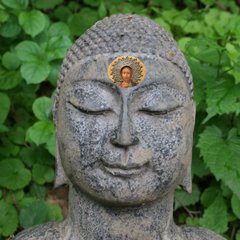
Thursday, May 14, 2009
There is no "Gurdjieff Work"

Traveling and pondering
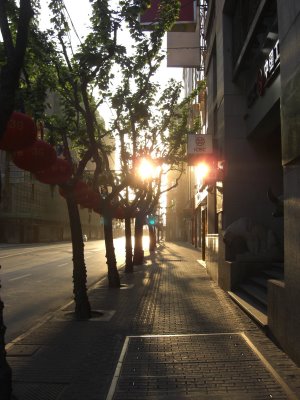
A personal note I sent to friends this morning. It seems a good piece to wrap up this trip with.
On the train to Nanjing.
Following an experience while sitting this morning-one of those sittings that calls everything into question, until even the questions themselves cease to be, ceded to the Authority of a power greater than "how" or "why"-
-I ponder the following:
What does it mean to be held to a higher standard?
What would it mean if right now, within this immediate moment- and within all immediate moments- my effort is being measured against a standard set from a higher level- emphatically not my standard, not emanating at all from my will, but emanating directly from a higher will?
A standard I may even acknowledge intellectually, as a hypothesis, but cannot truly sense, and do not understand?
Perhaps I can then dispense with ordinary questions of morality and relativism. True, these principals exist and do not go away- and yes, I must even understand not only that I operate under them, but how to operate under them. Yet they are but a fraction of the larger question.
What is my responsibility? With what parts do I answer that call?
I see that I want to "do." Part of my wish-perhaps an essential part of my wish- is actually a wish to "do.". I am so engulfed by this paradox that only on rare occasions may I sense it, and then, only when a very fine material becomes available- a material which we can only define, if it is at all within our grasp to do so, as Grace.
It is within seeing the deep and urgent necessity of surrendering my wish to do, to act, to control, that I truly begin to discover my nothingness, and to begin to sense-not with my intellect, but with the finer parts of my attendance- my nothingness, and how utterly I must acknowledge the phrase:
"THY will be done."
My responsibility-my work- begins with, and rests on, a deeper understanding of what this means.
Within the privilege, and the bliss, of such an offering- the very same sacrifice required of Abraham, that is, a sacrifice of everything that is born of me- the flower of remorse opens for a moment, and the tears of my own inadequacy and iniquity arrive.
I'm not worthy of that blessing, but I suppose none of us are.
Within all of this, can I make an effort today to remember that my work-my effort-my Being itself-is forever measured, in an active, living, and intimate manner, against this awesome and unconditional love that births us and gives us life?
How do I meet my life in regard to this? In each moment, I am given the opportunity to explore that question.
The choice is mine.
May our hearts be opened, and our prayers be heard.
Friday, May 8, 2009
The Luggage Carrier
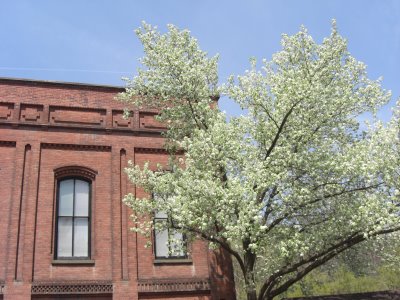 This morning, I begin to write not knowing what I will write.
This morning, I begin to write not knowing what I will write.I've noticed that I have a habit of thinking about what I will say before I say it. There is a process of formulation in the midst of life. The intellect creates a precondition based on surrounding circumstances, and the body delivers it.
Because I am reasonably clever (not a quality that I think becomes a man very much, in the end) I am often successful in putting across formulations that work. More often than not, they are designed to make people laugh -- and, of course, to show how clever I am. If there is a better example of the subtle works of ego, I don't know what it is.
I often catch myself in the midst of this formulating, and wonder what it is all about. The freshest and most delightful exchanges in my life seem to arise without such formulation. They are spontaneous and live within the moment, without a plan that precedes them. One might say that they are responsible -- a peculiar use of this word, to be sure, but there it is. I say responsible because they are a legitimate response, something that arises in direct relationship, not a pre-planned event to show off the ego or the intellect.
They come from not knowing.
This, of course, is the wellspring of anything real in the enterprise that we call "art." Real art arrives from nowhere and expresses itself perfectly and effortlessly. And the real art of living, as I have said before, lies not in the making but in the seeing.
So I don't know what will come as I write this. It simply arrives.
This is something like my life. I try to formulate it and imagine it; there is a part that attempts to preconceive it, to picture it, to lay it out in front of me the way it will be (or, perhaps more accurately, the way I think it ought to be.) But when my life actually arrives, it is utterly mysterious, magical, in every moment.
It isn't like the formulations or the imagination. It doesn't match the cardboard cutout that I made of how it should be. It is, instead, miraculously unformed, and a continuous surprise. It is playfully, delightfully, beautifully free of all the baggage I bring to it.
Of course, I usually don't see that, because I have all these heavy bags I need to carry. Parts of me are convinced that all of this stuff is absolutely essential and must be dragged along to each moment. Every moment needs a big, impressive pile of stuff in it. When I arrive at moments without my pile of stuff, it could be dangerous. The stuff is a talisman I hold in front of me in the desperate--and perpetually doomed--hope of eliminating this absolute uncertainty--which is, like it or not, the very essence of this process of living.
I evolved--man evolved-- to be flexible enough to handle this, yet I have become quite rigid.
I would like to end my career as a luggage carrier, because the tips seem to be extraordinarily low. I keep trying to do that, but I keep forgetting. Every time I forget, I pick the bags up again. As in a dream, I suddenly realize that I am carrying the bags. I drop them again, resolving to never again have a bag in my hands.
In the next instant, I discover myself with bags weighing me down once again.
So I come back again and again to this effort to stop making the effort of carrying all these damn bags.
Perhaps that's enough for today.
May our hearts be open, and our prayers be heard.
Wednesday, May 6, 2009
Saying No to No
 Back
in Shanghai, where a crisp impression of both newness and continuity
with the moment was available this morning. Up early (at 5 a.m.) I
walked down Nanjing road, into places, sights and smells which I already
know, but are also new, fresh, and different.
Back
in Shanghai, where a crisp impression of both newness and continuity
with the moment was available this morning. Up early (at 5 a.m.) I
walked down Nanjing road, into places, sights and smells which I already
know, but are also new, fresh, and different.When I am away from a place, its existence becomes a faded memory, a shade of approximation. It's only in the immediate presence of the actual impressions of a place that I can understand that place; before and after that, its existence is purely imaginary.
I saw this morning--as on many mornings-- that there is a negative polarity within me that actively opposes the meeting of life. I have inner parts, or pathways, that construct dialogues of doubt and of "no;" parts that do not want to meet the mystery of life--its ever-present quality of active manifestation of the unknown into the knowable. They oppose the idea of meeting life at all. Like a sulking child, those parts seem to want to stay home and hide.
We sometimes call this "resistance" in the Gurdjieff work. I suppose the word "resistance" is sufficient, but the concept doesn't speak to the depth of its roots, or the question of why "parts"--tendencies-- which, for all intents and purposes, don't even want to live, form in me.
Where do they come from? Many mornings it seems I find myself having to say "no" to this incessant, plural "no" which arises in me. That's necessary first, before I can begin to undertake even the ordinary work of life. My working hypotheses for a number of years has been that this negativity arises because of a lack of decent connection between centers. It's more prevalent in the morning because the various centers are not up to speed with each other yet.
It occurs to me to examine this in the context of Mr. Gurdjieff's adage, "Like what it does not like.". In this case, "it" does not, it seems, like much of anything at all. "It" mechanically resists engagement; constructs a fabric of "cannot;" refuses to discover even a benign neutrality. "It" embodies an animated rejection. Perhaps it's just here that I can discover what that mysterious "it" consists of. "It" isn't even alive. It is just this... thing... inside that seems to want to drag the effort downward. To stop me, what lives in me--the parts in me that need to be responsible and to act--before I even begin.
And I can see how it is an "it." "It" wants to become what I am, it wants to be "I am," even though it has no right.
The church fathers called such "inner voices" the work of demons, or even the devil himself, and in an odd way this makes sense. This impulse towards "no" is a reflexive one, automatic and mechanical; it mirrors what Gurdjieff thought of as "evil," that is, that which is not conscious, is merely mechanical. And I think he had this one right. It is, after all, the banality of what we call evil, its utter stupidity and ordinariness, that is perhaps most shocking. In the movies, when we create villains, it's not uncommon to polish them up with some kind of glamour, but real evil is not like that at all; despite the proclivity it has for creating drama and excitement, its origins are all too frequently almost clerical and clinical in nature. It feeds on rationalization, and clothes itself in the routine.
As Krishnamurti said, such qualities are not the qualities of "others." Such things begin right here at home, in each of us. These automatic impluses towards "no" are the embodiment of a real, manifested force that works against wish, and against the vibrant force of a real inner life. They give me a very practical opportunity to see my mechanicality from a slightly new perspective.
The effort to bring one's self into positive awareness as an opposing polarity to this "impulse towards no" is part of what it means to become more actively inwardly. Not only do I make the effort to see where "I am," I also make a choice to affirm my possibilities. Here I discover yet another meaning of the phrase, "Use the present to repair the past and prepare the future."
The negative polarity works hard; it is always engaged in an effort to dominate the inner exchange. But it's possible--perhaps--to measure this from the perspective of opportunity, instead of pitfall. My inner life would become flabby and weak, were there nothing to exercise itself against. This reminds me of what I have been discussing in the past few posts; life is not about my happiness. Life, everywhere, is a struggle. We see this in biology, and we see it equally active in the evolution of inner psychology. By struggle I mean efforts; I am here to make efforts. Not to be happy. It's true, happiness can arise from efforts. Real happiness may not be able to arise from any other locus.
There is one thing that is certain, the habit that mankind has developed of trying to avoid effort in an effort to create happiness -- to achieve, as it were, "effortless happiness" -- is a futile one. Real satisfaction arrives in the organic investment in the act, whatever the act is. The inner impulse towards "no"is an impulse to negate action, to try and stay in one safe and comfortable place. Of course, no such thing is possible. It's only within the context--the exquisite anguish -- of action that I can discover the resolution of the polarity between yes and no, in the intervention of the reconciling force. I say "exquisite anguish," because it is the uncertainty of the present moment, and my wish to avoid exactly that, that has to be faced.
So even as I dwell, appalled, within myself, surprised at this wish NOT to be, and discovering (all over again, each day) the need to resist the resistance, there is a pivotal moment where this inner angel I wrestle with is overcome, and "I am- I can" arrives within.
That is perhaps a small moment of liberation, but a real one.
may our hearts be open, and our prayers be heard.
Friday, May 1, 2009
All here together
Thursday, April 30, 2009
Happiness, authority, and illusion
Thursday, April 23, 2009
Work as Custody and Stewardship
 We all have this conviction that our life belongs to us.
We all have this conviction that our life belongs to us.From an intellectual standpoint, there may be considerable understanding that this actually isn't true, at least from a metaphysical point of view. But the reality is that we all experience our life as belonging to us, because that is how the ego functions.
The dialogue is all too familiar in me. This is "my life." I want to make my life more complete. I want to live my life fully. I want to do this and do that. The choices are up to me, and I can do as I wish.
In the end, nothing could be further from the truth. In the Lord's prayer, the phrase "Thy kingdom come, Thy will be done" is meant to be a specific confession of the fact that life does not belong to the individual. Life itself is a force, a force that cannot and does not belong to the vehicles that express it. The vehicles are expressors and expressions, not owners. This is true from the smallest microbe all the way to man.
Every one of us is a custodian of life. A steward of life. Each one of us discovers ourselves in the unique and poorly understood position of being granted the privilege of participating in this force called life. Every life is bought dearly; billions of years of evolution were required to bring us to where we are right now.
We dismiss all of that with simplicities. For example, we see a creature and we say "bird," as though four letters were a decent substitute for an absolute miracle born of dinosaurs 65 million years ago. The bird is a custodian of everything that went before it -- in and of itself, it contains the entirety of everything that life expresses.
So do we.
So I come to my life as a steward. I have a responsibility to it. That responsibility is rooted in the organism and the active expression of life as it is created and goes forward in every moment. My stewardship consists of an effort to be within the moment and honor that moment. Within this context, every event, every action, every movement, every object, every breath is sacred.
The organism is built to sense this. Unfortunately, my own organism is blunted and damaged; it has some limited sensory ability to know and understand this truth, but that ability is circumscribed by the relatively poor functioning of my consciousness. I am disconnected. I may speak about being in the moment as though I knew what being in the moment were, or as though I could "do" being in the moment--but in the moment where one truly discovers the moment, one discovers that one does not know the moment, or even how to be in it.
Instead, one knows a few clever words, which become quite useless when truth arrives.
In moments of a greater connection, I begin to sense my stewardship. At moments like this, every event and circumstance is miraculous, and nothing belongs to me. I am humbled by the place I occupy and the privilege of seeing something as simple as a crack in the pavement. A deep humility grows as I see how small I am, and how incredibly little I understand. Even in the midst of participating in life -- in the midst of successfully starting a new job and offering intelligent work to my employers and the individuals I work with -- I see that I understand nothing about this planet or life itself.
The best I can say in the context of that moment is that everything is a mystery, and the parts of me that function in relationship to ordinary life do so only because they have learned it by rote.
In the meantime, the parts that can sense the miraculous nature of this stewardship more directly are bewildered by the astonishing variety of manifested nature, and the incomprehensible glory of even the simplest impressions.
How do I honor this life? Not very well. Do I understand that every individual and circumstance needs to be treated as though they were sacred? No, I don't. I generally live with the conviction that others should serve me as I wish, and that events and circumstances should serve me as I wish. It is my will that I want done. All this in sheer defiance of the prayers I study within myself.
Those prayers need to become more than words. They need to become active affirmations of an effort to discover the "I am" of stewardship.
If there is no deepening humility, no organic sense of sorrow, no humbling of the understanding, and no remorse in the simple act of taking in life, there is no work. Every drop of arrogance is a measurement of my lack. And, unfortunately, in this particular regard, my cup runneth over.
May our hearts be opened, and our prayers be heard.
Sunday, April 19, 2009
Gurdjieff Ouspensky, and Christ
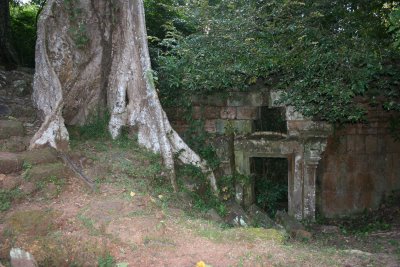
There have been a number of occasions on which I have discussed the connections between Gurdjieff's metaphysics and Christianity, most particularly inherently Christian.
In the last post, I mentioned Hesychasm and the Philokalia, and I feel it would be instructive not only to direct readers to links explaining these terms, but also to discuss their implications in terms of an examination of Gurdjieff's teachings.
The Philokalia are a set of teachings from the early Church fathers in which one can easily discover the roots of many of Gurdjieff's ideas. Not only do we encounter the (central) idea of inner silence as it is taught in the work today, we also repeatedly encounter the idea of sensing the inevitability of one's own death, and the need for relentless efforts in the pursuit of inner perfection. Even one of the key "mantras" from the Gurdjieff work-- Lord have mercy -- is nothing more than a contraction of the prayer of the heart: "Lord Jesus Christ, son of God, have mercy on me."
Gurdjieff carefully and intelligently deemphasized the Christian elements of his teaching in order to make it accessible to as many searchers as possible. His efforts in this area were good, but they weren't "perfect"-- in the end, one can't take the apple out of the apple juice. One suspects from his own comments, that it was, in the end, Gurdjieff's gradual approach to the core of his own teachings -- a core which was irrevocably Christian -- that led Ouspensky to leave him. We can collectively delight in the irony that the almost Calvinistic severity Ouspensky reflects in "In Search Of The Miraculous"-- the unending need for effort, the deep and difficult slope that has to be climbed, the constant demand on a man in order to reach his aim -- all appears, almost to a certainty, to be derived directly from the teachings of the early Church fathers as encountered in the Philokalia.
It's true that these texts use language that centers all of their practice powerfully around an understanding of Christ, and polarizes it with the constant invocation of demons and Satan as the opposition. If one just changes a few words, however, one ends up with a set of texts on esoteric practice that even a Buddhist might feel quite comfortable with.
Ouspensky's "In Search Of The Miraculous" does an excellent job of expounding Gurdjieff's cosmology, but at the same time it sets a tone I have never been entirely comfortable with. There is an underlying taste of negativity in the severity he presents. And it is indubitably true that anyone who tries to reconstruct the Gurdjieff teaching from this book will get it wrong. The way that the Gurdjieff work as it has been passed down from master to pupil, directly from Gurdjieff himself in a straight line, is not accurately reflected in this book. Outsiders may argue this statement, but with few exceptions anyone now in a direct line of transmission from Gurdjieff will agree that it is essentially true.
A second difficulty with the book is that it is a document frozen in time. Works evolve and change according to the times, the circumstances, and the individuals practicing them. The record of the work as it existed in the early part of the 20th century is a document, not a living tradition. And that is what we have in this wonderful book. We have a document. The living tradition resides in the efforts and the relationships of the individuals who practice. That can never change. All the wishful thinking in the world about transmitting the work over the Internet will never make it so.
The Gurdjieff work today is populated by a diverse range of pupils, including Christians, Muslims, Hindus, Jews, agnostics, and even atheists. (I will confess I don't understand what the atheists are doing here, but they are welcome. Anyone who wants to work on themselves is welcome in this work.)
Some may question how a work that was so clearly influenced by yoga--in fact, in many ways Gurdjieff's work is a reinvention of yoga, with new terms-- could really have much to do with Christianity. I think the answer to that question lies in the reverence that yogis in India hold for Christ. In yoga, there is truly no controversy or contradiction about the idea that godhood can be embodied in man. One need only refer to Paramahansa Yogananda's writings to see just deeply the understanding of Christ can be integrated into yoga tradition. And, as I have pointed out in other essays, to presume that Jesus Christ did not encounter the ideas or practices of yoga beggars the question. He lived in a region where those ideas and practices must have influenced religious teachings for hundreds, if not thousands, of years, simply by virtue of the fact that ideas traveled on the silk Road along with the merchandise.
In summary, the practices are not at all separated.
Anyone seeking to gain a powerful understanding of the roots of Gurdjieff's teaching needs to pick up a copy of the Philokalia and to read it in some depth. There are particularly interesting passages regarding the practice of using the sensation of breath to connect the mind to the heart. Readers of my own essays on esoteric practice as found at www.doremishock.com will probably recognize those connections (although I had not read the Philokalia at the time I wrote those pieces.) It simply underscores the fact that the Gurdjieff work, if properly practiced, inevitably brings one back to practices that the desert fathers well understood -- practices which an Indian yogi or a zen buddhist might be entirely comfortable with.
I'm not sure that it's possible to pursue the Gurdjieff work to the depths and heights that it offers without coming to grips with the question of Christ. I know that this idea makes many practitioners uncomfortable, and there are forums populated by individuals on the periphery of the work, or not formally associated with direct lines of work, who strongly object to that understanding. Nonetheless, I stand by it.
One cannot practice this work without seeking Christ.
There is good news in all of this. Episcopalians (I am a member of the Episcopal Church) have an agreement among themselves that we all understand the religious texts used in the service -- as well as the text in the Bible -- differently, but that we all agree to worship together. This creates an atmosphere of unity in diversity.
On the other side of the coin -- the secular side, so to speak -- we have Stewart Kauffmann, who offers essentially the same perspective in his terrific book "Reinventing The Sacred."
The point being that we can put our disagreements and (opinionated) understandings aside and instead simply agree to work together. It is within the actual context of the relationship, within the act of working its self, that we discover both our effort and ourselves. If a man or womam needs to understand the idea of Christ differently than I do in order to approach it, so be it. She or he may understand it as light. He or she may understand it as love.
However it is understood, it leaves us in the position of acknowledging that there is a mystery on the level above us that we need to open our hearts to.
And, as I continually experience, if we do not open our hearts to one another -- if we do not learn to more openly trust and love and support one another -- we have no business pretending that we can open our hearts to a higher level.
The work begins here and now, between each one of us.
May our hearts be open, and our prayers be heard.
Sunday, April 12, 2009
Remembrance of things past

The job is in Georgia, in McDonough--a town very close to the one I used to live in before my divorce. Consequently, when I arrived here last night, I drove down to Griffin to take a look at the house I lived in. I have been getting it ready for sale, and I wanted to see what kind of condition it was in after my ex moved out.
The drive down was a poignant passage through time to the places where I raised my children. I passed the Burger King we used to buy them food at, drove down roads lined with azaleas and dogwoods in bloom. I finally reached the property on the south end of town, right where the countryside truly begins.
When I reached the house, twilight was setting in. It was the first time I have set foot on the property in over nine years.
The house was dilapidated, deserted, ruinous, and the property was overgrown. Long shadows cast by Leyland Cypress trees -- I planted them when they were knee-high, they are now over 30 feet tall -- painted a somber light on the west side of the house. In the backyard, there were ruined sofas and stereo systems on the patio. The picket fence around my garden was twisted and skewed by an overgrowth of bramble. The swing set my children used to play on stood in mute testimony to happier times. The house, trimmed with rotting wood and flaking paint, looked far more like an abandoned tenement than the upstairs, exclusive property it ought to be.
The sight did not make me sad. Instead, I pondered the truth of it. This particular moment in life, where I see the conclusion of something that started in hope and with promise, is connected to what went before it every way. I consumed the impressions of my life from then until now. I see that so much of what happened along each step of the way was imaginary relative to where I stand today.
The future is never what we think it will be; it never takes place where we think it will take place. It always takes place here and now.
As I stand at this moment in time, beginning a new job, I see again and again that I am within a moment of life that is new and that will never come a second time. Moments of lucidity arrived today in which I saw that life was forming itself within the moment. It reminds me of a line from Gabriel Garcia Marquez's "Love In The Time Of Cholera":
"... he allowed himself to be swayed by his conviction that human beings are not born once and for all on the day their mothers give birth to them, but that life obliges them over and over again to give birth to themselves." (p. 165)
As
I stand in front of this new octave in my life, which is inevitably and
irrevocably formed from everything that has gone before it -- both the
perpetual creation of life, and its concommitant destruction -- I see
that I cross vast chasms of time as I live, forever unable to fully see
into the reservoir below me. The impressions I take in send roots deep
into the darkness of my psyche, and I am filled with countless things
that I cannot remember, but that nonetheless form part of everything I
am and will ever be. Here,within the flow of impressions, is where the
sacred river runs--through caverns measureless to man.
In revisiting my past here, and standing within the moment of re-forming my future-- which is always now -- I hear voices speak within me of what has gone before.
Not all of them are benign.
The Hesychasts of the Philokalia would tell us that the negative voices we hear within us are the voice of Satan -- and I am not so sure, in the end, that they are wrong. There may be demons in us, but they are our own demons, not any creature of God's creation. The voices sometimes wish us to think that we cannot go on, that bitterness is sweet, that the keeping of accounts and revenge is just.
Every man who searches discovers a negative side within him, and every man who searches must come to terms with the destruction of his hopes and dreams as they meet with the cold light of reality. The test that we have put in front of us is to discover our value in the context of reality, not in the context of our dreams.
As I put it to my wife several days ago, we must discover our happiness within the adversity of life, instead of trying to eliminate the adversity in order to discover happiness. Almost all of us have this backwards most of the time.
So when standing in the driveway of the house that I moved to in 1995, believing in a future for my children-- and my marriage -- which was never to be the way I dreamed it would be, I can look back on everything that took place, stand here and now, and make the determination that I will look forward.
This going forward will not be any easier than what went before. There will be good things and bad things. I will be afraid, and I will be hopeful, and there will be joy and pain. These are the conditions that God gives us. In the end, seeing the wholeness of my life, I can begin here with gratitude for the fact that I have lived at all, and contrition for my inability to meet my life in the way that our creator wishes us to.
Last night, I slept uneasily. In my dreams, a cast of characters from my past (and present) came together at the checkout area of a Home Depot for a meeting: my ex wife, my children, my old girlfriend, and even my golden retriever Socrates, who died many years ago.
My ex-wife asked if there was bread in the house, and I told her yes.
I am left with the faith that in this life, there can be a healing. That healing is not mine to create or to give, but rather to receive. As Mr. Gurdjieff instructed us, we can make an effort to use the present to repair the past and prepare the future.
There is bread in the house.
May our hearts be opened, and our prayers be heard.
Tuesday, April 7, 2009
To Grace, Through Experience
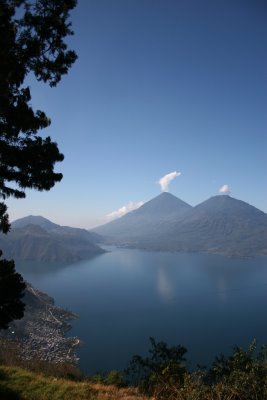 My
goodness! Where have I been lately? Not to Lake Atitlan, although
that would have been super. I have been busy getting ready to start my
new job, with a side excursion to see my parents on the Outer Banks of
North Carolina.
My
goodness! Where have I been lately? Not to Lake Atitlan, although
that would have been super. I have been busy getting ready to start my
new job, with a side excursion to see my parents on the Outer Banks of
North Carolina.I have also been waking up in the middle of the night and studying the question of how I breathe. There are moments in the darkness, when I find myself alone within my organism, where the simple study of the fact that there is breath and sensation becomes a deep meditation of its own.
During the last week I also came across the Philokalia, and immediately decided that I had to own a copy of these writings; so much of them speaks directly to the search I find myself within. They are a reminder of a deeply, and most esoterically, Christian aspect of my inner work-- what one might call a hidden side that does get discussed in this space on occasion, but must for the most part remain absolutely private.
On our way back from the Outer Banks, my wife and I began to discuss Grace, and how one comes to it -- if one does.
It is only within a state of receiving, a state of Grace, that I discover and establish a material experience of life. The material experience of life is absent in sleep. There is, of course, a substantial presence of materialism within ordinary life, but to have a material experience of life is not all the same thing as the ism of it. One is the tangible ingestion and digestion of impressions; the other is an attachment to objects. The processes of the organism are not objects, they are experiences. An investment within the experience -- especially the organic experience -- leads to a kind of food that is not available under any other kind of circumstances.
So when I speak about investigating my breathing in the middle of the night, the connection between breath and the body, I speak about a material experience, and I speak about an inner search that wishes to discover the real nourishment that is available within that experience.
So what do I mean when I use the word Grace? After all, this word is used so much, there seems to be little doubt different men could mean different things when they use it.
For myself, it means to have a certain kind of inner connection deep within the body, a sense of the bones of my bones. The living sensation of the marrow. At the same time, to have a real feeling, a sensitive and quite physical emotional contact with the immediate circumstances of my life. That experience may be somewhat devoid of what I ordinarily might call thinking. It does not, at any rate, consist of intellectualizing. There is a quite definite form of awareness there, but that awareness primarily consists of sorrow and the understanding that I am mortal.
Within that sensation, that three centered experience of my life, there is a much more immediate sense of being fed, and of having a direct responsibility for my manifestations. Are there elements of what one might call the sacred? Of course there are, but how can we describe that? The sacred can only be indicated by the spaces between each word, and perhaps never by the words themselves. We point to the sacred with what we do not say, rather than what is said.
For myself, I see that I must allow the inner process to help me cultivate a much deeper respect for, and appreciation of, others. Without labeling it watchfulness, or attention, or mindfulness as I live within the experience, I must allow experience -- I suffer experience. Within that context, deepening my tolerance (as one of my essence-brothers calls it) I grope my way towards manifestation as befits a three brained being, or a man without quotation marks.
Thinking about how I will do this is pointless. I cannot do this. There is, however, the possibility of discovering how to inhabit my life, in which case, something can be done.
What is then done, however, is not of myself.
It is a gift that we might, if we had to use words, also call Grace. That gift is only earned by payment in advance, and that payment can only be made through participation in experience.
Tomorrow's post, presuming I follow today's aim -- which is not, as readers probably know by now, guaranteed-- will be an interesting (to me, at any rate) comment on the Yogic Christ.
May our hearts be open, and our prayers be heard.
Tuesday, March 31, 2009
No Certain Words
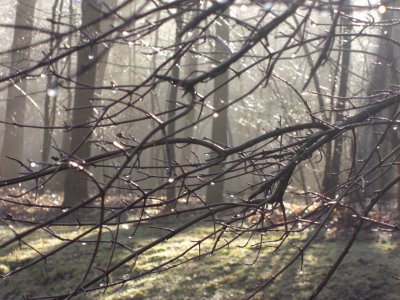 Yesterday
was a day filled with the deep promise of the color of spring. The
blue sky, sun, and birdsong overwhelmed me with their perfection.
Yesterday
was a day filled with the deep promise of the color of spring. The
blue sky, sun, and birdsong overwhelmed me with their perfection.Is life just things that happen? No, it is a rich wine I am invited to drink--if I am up to some serious drinking.
I take the famous dog Isabel for a walk in the park. We set off into the woods, walking on less familiar paths.
I pause to examine a single briar vine, decorated with tiny buds and the ever so smallest green leaves.
Every set of leaves emerges from this pink stem as if by magic. The edges of every leaf are tipped in splendid red.
My sense of familiarity consistently betrays me. Suddenly I see--filled with life, expressed within the magnetic experience of this organism I inhabit--that nothing is familiar.
I don't know where I am; I don't know where I came from; I am never sure of where I'm going.
Within the midst of this mystery, all of the parts that clamor for acknowledgments, for recognition, for something more concrete to hang the hat of my ego on, take a back seat.
If there is one thing the inner path and the opportunity for work affords me, it is the courage to admit that I know nothing. In the midst of my knowing, my collections of facts, and the vast repository of not-inward-formation our technology and society have produced, it's possible to look at a single tiny leaf and admit that the truth within it is inexpressible. It doesn't matter how much biology one understands; it doesn't matter how much analysis I engage in.
If I truly become more open, none of this is necessary.
Of course, within this moment, what expresses itself is not of the mind. Or, rather, it comes from a mind that is more whole, unique, composed of multiple parts, and able to sense in a way that the intellect alone cannot comprehend.
Accompanying the sensation of this moment is a deep and lasting sorrow.
Should I call this remorse?
Remorse of conscience?
A sensation of the sorrow of God?
There are no certain words for life. Men would have them, just as they would have happiness, and joy, and a thousand other things that desire produces. But if I take just one step past desire and into mystery, I discover cravings that do not spring from the obsessions I usually occupy myself with.
There are ten thousand paths that point towards joy; there are another ten thousand paths that point towards detachment and freedom.
But how many paths point us towards the sorrow at the heart of the universe?
A quietness can be born in which I appreciate the bliss of unknowing. This stillness invites a sensitivity that is more willing to receive.
May our hearts be opened, and our prayers be heard.
Thursday, March 26, 2009
Dancing with God
We dance with God
And then go home,
And write reports about it.
I wrote this little poem earlier this week after listening to exchanges about inner work.
I have had the great privilege in the last few months of working with Martha Heynemann in a poetry group. Martha's approach to poetry is an effort to discover a path towards the sacred using this art form. In her estimation, it's well-suited.
I can't speak for her, but I will speak for myself from the impressions that have collected in me as a result of her guidance.
In poetry, it is the spaces between words -- the things that are not said -- and the use of metaphor, which also leaves space, that creates the opportunity for sublime expression. Much of what is searched for remains unsaid, and falls into a place within the listener that needs to be discovered, rather than stated.
So, paradoxically, it is what we do not say, and must (in this medium of poetry) never say, that conveys the essential meaning from within.
I bring this up because I think we all make too much noise.
I am very guilty of this myself, to a certainty; from the time I was young, I was accused of having verbal diarrhea. It has taken me many years to become more concise and my expression and to find a place within myself that is more relaxed and willing to listen. This is an ongoing work, and never a place I finally "arrive" at.
In speaking of my experiences -- and here I speak specifically of those experiences where a higher force touches us -- I am in perpetual danger of becoming a clerk of the sacred. The more such experiences one has, the less one ought to talk about them. It may be painful for all of us to live in a world of exchange that is composed mostly of allusion, when everyone hungers for the definite, but the definite is the enemy of the true. (That statement, also, is an allegory, which should not be taken as definitely true. What is said must be read between the lines.)
When I go directly at things, when I reduce them to words and lay them out on sheets of paper -- or spread them like butter in conversations -- I always run the risk of saying too much, of killing the goose that laid the golden egg. Just as in seeking an intimacy with my organism, an intimacy must also be cultivated within the relationship of exchange.
Words should be chosen carefully and used sparingly.
There are a few other thoughts that I had over the last day or two. One of them is that we often speak of being "in the moment."
This expression is misleading.
My effort must be to be in this moment, not "the" moment. When I say "in the moment," I have already outsourced the effort to a different moment, not the one I am in. Do I understand this? I must stop outsourcing the moment.
It is this moment that needs to be in front of me.
And this morning, when I sat, it occurred to me that the fruit the tree gives is always sweeter than the fruit taken from the tree.
May our hearts be open, and our prayers be heard.
Monday, March 23, 2009
Quietly Attending
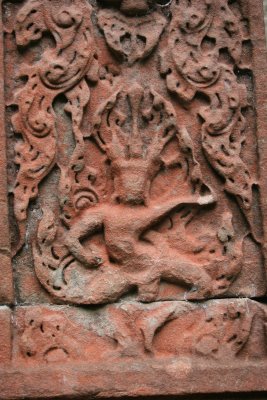 There's a great deal going on.
There's a great deal going on.No matter how I meet my life, it's always busy. Children need to be managed. Business matters arise. Friends call; problems surface; the unexpected arrives.
In the midst of all this, there's a need for intimacy. If there is something lacking, it is this; the intimate examination of Being.
That intimate examination needs to begin with the organism, which has the potential for a connection I usually neglect. Even when the organism issues a call for relationship, it's easily avoided; the contingencies of life, and identification with them, draw me away.
There's a bird's nest in the mind: a comfortable, constructed place where entangled thoughts reside. To be sure, it's a place with the potential for nurture; a place where something new might be born. But there I sit, up in the head, happily ensconced among the brambles.
And below? Below there's a fox hole, a dark den where something animal, something connected with the earth, resides. There, too, something might be born and nourished. But the fox is primarily nocturnal; it's clever, elusive, careful to remain hidden most of the time. And why not? The fox is eternally hunted by the hounds of life. It's grown smart enough to known when to hide, because it is eaten so often: for five hundred lifetimes, perhaps, it's been eaten.
The call for relationship between these parts, these animals of dens and nests, is interfered with by my thinking, which enjoys living in a perpetual state of evaluation. In taking too many measurements, the dimensions of the temple are obscured. There is a time when the artist needs to put the ruler down and just appreciate the aesthetics of the work from a different point of view.
So I wonder, am I able to bring a new quality to my effort today: an effort of quietly attending, attending to the arising of sensation without the interference of words and thoughts?
Can that part step aside to just intimately examine what is present?
Can that intimate examination consist of something other than ideas?
May our hearts be opened, and our prayers be heard.
Sunday, March 22, 2009
Fox Holes, Bird's Nests
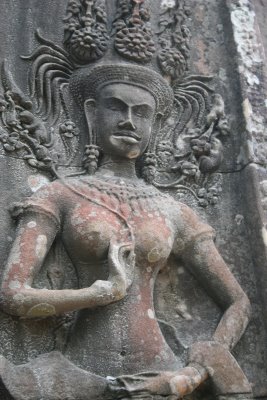 A
recurring theme in my examination of my work is the question of inner
and outer perception. Of course, we could also speak of this as inner and outer impressions. I'm reminded, perhaps, of fox holes and bird nests.
A
recurring theme in my examination of my work is the question of inner
and outer perception. Of course, we could also speak of this as inner and outer impressions. I'm reminded, perhaps, of fox holes and bird nests.One of the aims in Zen and in Yoga, one might say, is to go ever deeper within.
This, I think, is a good aim. Because I forget that there is any depth at all within me -- because I do not have a good connection with the organs that collect finer impressions -- there is often a flatness here where there should be depth. In order to attain any depth, it's necessary to place the attention quite specifically within a part of the body and to bring the effort and sensation to that point.
Now, there are a number of ways to do this, and I don't wish to provide instruction here. Not on specifics, anyway. What I do wish to mention is that this point of work is not well understood, and needs to be investigated much more precisely, much more thoroughly, and needs to be investigated actively within the context not of just sitting in meditation, but ordinary life.
Avoiding this question within this moment because I am overeducated, tired, bored, indulgent, or impatient will not help my work.
The reason for this need is, paradoxically, because the point of inner work is not just to go deep inside.
It is not just to develop a comprehensive sensation of the inner parts of the organism. It's true that the organism is divided into sensory apparatus for inner and outer impressions, and that each one forms what might be called a separate system. The important point is that the system is not separate at all--it's a whole and single entity, a co-operative structure that interacts. I can't, for example, separate the coarse from the fine if I don't receive any coarse in the first place.
Because of my proclivity for engaging in dualistic thinking, whenever I run into systems that have interactive structures of this kind -- for example, the universal system of evolutionary and involutionary forces --I begin to separate them, as though one were good and the other one were bad. So, for example, I might say "Evolution is good. Involution is bad." Or, on the other hand, I might say to myself, "An inwardness is a good quality. Outwardness is a bad quality."
I forget, perhaps, that neither one can exist without the other one. I even forget that if I am receiving something from a higher level, that is in and of itself an involutionary action, because an energy from above is moving down to me. So in my zeal to evolve, I lose sight of the fact that my own evolution depends on involutionary forces.
One of the tricky things about understanding inwardness is that I know next to nothing about it. If I actually began to experience a specific understanding of this question, it becomes enormously attractive. The temptation to fiddle with it is moreover nearly irresistible. I come to it without understanding, and especially without understanding that it is able to work in its own way if it is not interfered with.
I come from a world where all we ever do is interfere. There are even whole systems designed to help interfere. They tell me how to interfere, when to interfere, why to interfere, and what to interfere with.
Perhaps even worse, the cultivation of inwardness is beguiling. The process tends to draw me deeper and deeper into itself. Sometimes this even takes place at the expense of what is necessary.
So in my effort to go deeper inside myself, is there a chance I am actually forgetting myself?
Does my effort need to be to stand in the middle, at the intersection of the inner and outer worlds, at an interval between two notes? At this point where involutionary and evolutionary forces meet? Isn't that, after all, exactly where consciousness -- such as it is, such as I experience it -- actually resides?
This is a delicate question.
Somehow I think that if I am not inward, I lose something. Or, if I am not outward, I lose something (this last is more common.) Where I believe I lose something, however, is in not being poised between these two sets of forces. Ultimately, within the question of this work with my inwardness and my outwardness, there is a need to bring the two together. One must strike an intelligent balance.
There is a risk in this place. The fox-hole peace and security of inwardness, the bliss and safety of immersion in a gift that is given, must be sacrificed.
The bird's nest of my ego, and my identification with my outwardness must also be sacrificed.
...And where, then, do I find myself?
Is it, perhaps, in a place of exquisite uncertainty, where there is nowhere to lay my head--where conditions must, first and foremost, be accepted?
May our hearts be open, and our prayers be heard.
Saturday, March 21, 2009
Brief announcement
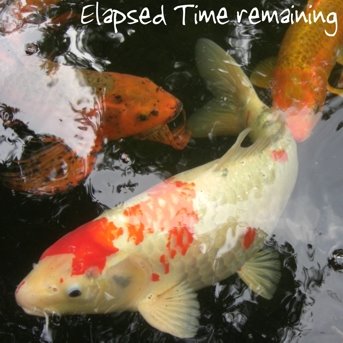
My new instrumental CD, "Elapsed Time Remaining," is now available in its entirety for download at www.compliquations.com.
The entire contents of my last two CD's, Compliquations, and Genetically Modified Freud, are now also available at the same site.
What is the price of a soul?

While sorting through old books in my possession, I came across a copy of Goethe’s Faust.
Faust sells his soul to the devil in exchange for information, for knowledge. The one great flaw I can see in this premise is that Faust, given how smart he is, certainly ought to know that no matter what you do, there is one thing you never, ever do, and this is to sell your soul to the devil.
Why does he do this? Perhaps it’s because Faust is quintessentially human: there are deals to be made, advantages to be gained, and everything is a negotiation. (“Faust,” by the way, means “fist” in German; and what more appropriate name for one who wishes to so firmly grasp?)
Well, never mind those little details. The discovery of the book got me to pondering about the soul, and death, and so on, and the pondering has continued, so to speak, unabated for days now.
Everything has its price. If man is, as Gurdjieff contended, a “soul in embryo,” then his life is the price he pays for it.
I don’t, however, properly understand this. From the perspective of ego, I behave not as though my soul belonged to God, but as though it belonged to me. As though my life—and my soul—were my own property, to dispense with as I please. In regard to this, I have a thought about religious conservatism. Despite all its excess, it generally has at least one thing right, and that is the idea that the soul belongs to God, and that our behavior should be moderated accordingly. (Readers will probably agree that we get more than a little of that flavor from "Beelzebub’s Tales to His Grandson.") If there is any one great failing in the interpretations of the religious conservatives—be they Muslims, be they Hindus, be they Jews or Christians—it is that the understanding of just how our behavior ought to be modified is very subjective. Secularism, on the other hand, has popularized the view that man’s life belongs to him and him alone; the idea is, in some senses, enshrined in the principles of the US constitution, although it’s fairly certain that that particular philosophical angle wasn’t first and foremost in the founding father’s minds when they wrote it. Modern science, leaving no room whatsoever for the idea of a soul or a God, can’t move past that same premise, because it lacks the philosophical equipment. So many of us—even those who are supposedly religious-- grow up in a confusing environment where the ego ultimately takes a front seat. To be fair, the problem isn’t a new one; it’s been this way in civilizations for thousands of years. In an age that, due to an overflow of information and the polarization of science and religion, must increasingly come to grips with these questions, we need the philosophers more than ever. Hence I was most amused to be sitting outside the library of the Gurdjieff Foundation last Tuesday and overhear the following snippet of conversation from within the library itself: “Do we need some Kierkegaard in here? Do we have any Kierkegaard?” “No, we got rid of all the philosophers.” ...To be fair, the library is a very small one, but I’ve perused the books, and there are more than a few we might want to consider “getting rid of” and replacing with some good solid philosophers. Back to the subject at hand. I don’t own my life or my soul. These elements of Being are not mine alone (despite our mantra of “I Am”), they belong to a set of forces much larger than me. They are a product of the intersection of many reciprocally interacting energies, and this “I Am” which I may (or may not) experience from day to day is not my own property, but rather a manifestation of something much larger which I lack the understanding to comprehend. If I do “have” a soul, such as religious believers propose—and yes, I feel certain there is a truth in this, although exactly what truth, I don’t profess to have properly understood—then that soul belongs to God. It is, moreover, a very expensive piece of property, and I have it only “on loan,” so to speak. If we examine the many parables Christ told about masters and servants I think we can garner a flavor of this idea: man is “given” his soul because there is work to be done on it; it's an unfinished entity. This is, of course, one of the main underlying principles of the Gurdjieff work, & we encounter this idea, or the seeds of it, in most religious practice. In all the Christian parables, and in other works, we also encounter the idea that failure to do one’s work gives "bad results." As the custodian of this precious entity called a soul, I understand my work to be the process of inward formation: of carefully learning how to digest the food that is given to me in life, that proper growth may occur. I don’t take this work seriously enough most of the time for three reasons: because I think this thing called “life” is mine to do with as I please, that my “soul” is my own property, and that there is plenty of time to get whatever needs to be done, done. And here we come to the crux of my point: I don’t see that the price I pay for having this life, this soul, is my life itself. In other words, the coin I must pay with is what "I" am,
and I make that payment with death. Thus the process of coming to God is enormously, impossibly expensive: in doing so I must absolutely surrender what I believe to be my very most precious possession: my life. To be sure, I am given the choice of surrendering this life willingly or unwillingly, but surrender it I will and surrender it I must. This is the point where my (and Faust’s) quaint little ideas that I can make deals, and that everything can be negotiated, come to a ruthless and uncompromising end. Apparently I can make a deal with the devil... but I cannot make a deal with God.
One might say that the devil, unlike God, is a salesman.
It is in the understanding, perhaps, of how I surrender my life and why I surrender it that something new may be born. Surely, we are offered enough parables in the Bible alone (from Abraham’s sacrifice right up through the crucifixion of Christ) to offer compelling evidence as to just how important understanding this question, that life des not belong to us, is. And, of course, this question is also central in Buddhism, especially Tibetan Buddhism. We live in a culture where the ego clings frantically to life. Even fundamentalist Christians do. In an exquisite irony, a recent study shows that in conditions of extremis, they cling to life more steadfastly than those without faith: in other words, when dying slowly, of disease, they live longer than those without any faith: on average, 30% (!) longer. So despite their intense belief in Jesus, they aren’t really in any hurry to meet Him personally. I can’t blame them, really. Given the way most of us behave in life, it doesn’t seem like a final interview that’s likely to go well. So, the more certain you are you will have it, the more incentive there is to put it off for as long as possible.May our hearts be opened, and our prayers be heard.
Wednesday, March 18, 2009
rolling rocks down hills
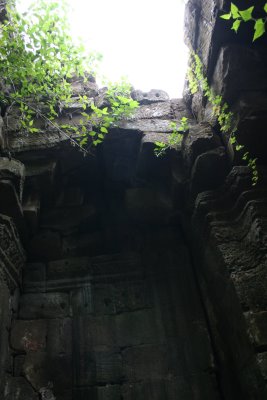
I have spent the last two days in intensive work of various kinds at the Gurdjieff Foundation. When I got home this afternoon, I felt like I needed some good old manly exercise. So I went up on the hill behind our house, a very steep wooded hill, and began to put in stone steps up to the storage shed. There is plenty of stone to work with; the area I live in is called Rockland Cunty, because it's littered with an unholy amount of glacial till.
This is the kind of exercise I absolutely hate doing before I have started it. I always hesitate and stare at the stuff in front of me and part of me says, forget it. Don't bother. This is going to be hard. I stand there like a professional exhaustionist who gets too worn out just thinking about doing work.
At some point or other, something in me commits. I begin.
Once I get started, I get deeply into the rhythm of it and am so satisfied with the demand that I just keep going and going. I will work without rest, deprive myself of food and water, and push myself to the point of exhaustion before I stop. Honestly, it's ridiculous. I often catch myself in the middle of these situations and ask myself why I don't stop and rest.
If ever there was a good illustration of different "I's" at work in a man, this is one of them.
Perhaps I should explain here, for readers that don't know this, that I am a rock hound. That means I collect rocks, mostly crystals and fossils, but I also have a weird and obsessive relationship with rocks of any kind, any size, shape, color, or provenance. In addition to my intense attraction to biology, I have never met a rock I didn't like. I pick up misshapen, unlikely, objectively valueless rocks and form relationships with them. To me, a rounded piece of granite looks every bit as good as a diamond. There is nothing rational about it, and perhaps that is one of the things that makes me enjoy it so much. This obsession with rocks compounds the project, because anything that involves rocks is twice as likely to become a subject for identification.
Well then. Having started this project with my beloved rocks, I saw other things that needed to be done with big rocks at the same time -- I'm like that. So I gradually began to move each separate project forward, as appropriate, given the materials directly at hand. The projects all eventually involved moving impractically large rocks. It's not good enough, you see, to just move little, reasonably manageable rocks around. The aim is to find rocks which it would be objectively insane to try and move, and then find a way to move them.
Ahem. Anyone who wonders why and how Stonehenge and the pyramids were actually built need only reflect on people like me.
We did it.
At one point, I decided it would be capital to move a huge rounded boulder into position next to our compost dump. The boulder was much higher up on the hill, but it looked like it would roll easily. As it happens, it must have weighed 250 pounds, well out of any reasonable range for a single man to move in any other way.
I managed to move it.
It did roll easily. It moved so easily, in fact, due to its very round shape, that it rolled all the way down the hill.
To my absolute horror.
There are lots of things at the bottom of our hill--for example, cars--that you definitely don't want giant rocks to hit. To compound the problem, the hill comes with some fairly high walls at the bottom which are perfect platforms from which said rocks could conceivably launch themselves majestically into the air ...if some idiot rolled them downhill.
I swiftly discovered that any round rock this big has a mind of its own once it gets moving. I found myself chasing it down the hill in a panic, realizing as I did so that even if I caught up with it, there was absolutely no way of stopping it.
I got lucky. The rock hit bottom and just rolled around in the driveway harmlessly, having done little damage. Even the delicate little boxwood tree which it ruthlessly rolled over on its way down seems to have sprung back up quite happily.
I'm not quite sure why I am telling you this story, but it seems that once in a while -- at least once every five or six hundred essays -- there ought to be an anecdote that is passed on just because it happened.
Are you disappointed? Shall I contextualize it for you?
Okay, it's not difficult. If you want to know how small and helpless you are, get a really, really big rock and start rolling it down a hill towards valuable possessions without any control over the path it takes. You will soon realize how basically helpless we all are when confronted with the realities of physics, let alone the relentless arrival of life at our doorstep.
...Another thing took place today that completely surprised me -- an absolutely unexpected event. I won't go into any details, other than to say that it was about a matter that has been worrying me for 10 years (no exaggeration, really) related to my divorce which, yes, was almost that long ago. The matter worked out in my favor, and instantly erased about 10,000 moments of inner considering I had devoted to trying to figure out how to handle it.
There was no way to have predicted this. I did absolutely nothing, but for some perverse reason I am left here with the feeling that I have accomplished something. Nothing, of course, could be further from the truth. As usual, I am reacting to life, not acting.
Perhaps we could call the relief of the pressure of inner considering an accomplishment, but it is an accident, not an intentional event. Even my intentional attempts, like rolling rocks down hills, don't work out that well.
So I need to see that my intentions, like my emotional state and everything else, are at the mercy of events much larger than me. Rocks are constantly rolling down hills in my life, and the best that I can do is try to ground myself in the gravity of my body and the vibration of my sensation in preparation.
I will leave it at that for today.
May our hearts be opened, and our prayers be heard.
Monday, March 16, 2009
Collapse
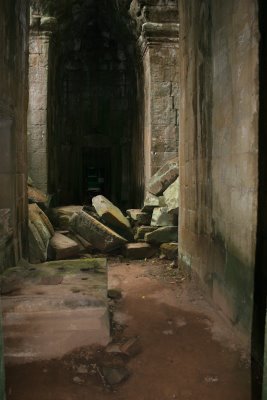 The emotional state needs support.
The emotional state needs support.Just like the body needs a certain amount of food if it's not going to experience exhaustion, the emotions also need a certain kind of food in order to stay positive. In the same way that we often don't feed our body with the appropriate food -- resulting in various kinds of disease -- we often don't feed our emotions properly either.
Unfortunately, there aren't any nutritional charts for emotion. You can't look at the three major food groups for emotion and decide which one you are low on. So emotional management becomes much more difficult than just eating bread or vegetables.
Every once in a while, I reach a point where the emotions don't have enough support, and I feel very low. Sometimes this is the result of disease; a viral infection will often produce a low point in the emotions, especially when it is beginning. At other times, after weeks and months of stress, sometimes unacknowledged, I hit a low point.
We talk about not expressing negative emotion in this work, but that is a lofty goal. There are times when I have to be honest with myself and see that I am negative, and allow the ordinary parts to express that in one way or another. Not with raging or destructive behavior, but rather, simply to verbally express the anguish and ask the questions that the state puts in front of me. Many years ago, my group leader Henry Brown mentioned that it is very important not to repress negative emotion. I think the bottom line is that there are times when I have to let the tea kettle vent a little bit, lest it explode.
Jared Diamond has written a number of very good books, the most famous of which is probably guns, germs, and steel. In his book Collapse, he writes about why societies fall apart. In reviewing this question of emotional support, I believe there are analogies between his analysis of what societies do and what we do with our inner lives.
One of Diamond's central arguments of collapse is that resource depletion has led to the destruction of many large societies. As societies grow larger and larger, they cut down more and more trees, deplete more and more soil, and eventually reach a tipping point where the ecological infrastructure can no longer support the population. Of course other factors are involved -- disease, climate, and so on -- but in most cases, we can see that the initial weakness in large societies was overpopulation and resource depletion.
I think that our personality -- or, if you will, our ego -- functions in much the same way. It grows larger and larger over the course of a lifetime, aggrandizing itself with its arrogance, and using others to get what it wants. By way of analogy, we are overpopulated by our ego. It is crowding out our life. Take a look, for example, at Bernie Madoff, the villain du jour-- perhaps a prime example. We love to blame men like this, but he is just ourselves writ larger. The ego appropriates everything growing around it in its zeal for expansion. In the midst of grabbing everything around us, we exhaust the inner resources needed to support a positive emotional state.
There is a perpetual belief that outwardness is what feeds emotional well-being. I meet this in people constantly. Everyone I know usually asks me to measure my satisfaction in life based on how much I like my outward conditions. I have reached a point in my own work where that measurement no longer seems applicable. No matter where I am, or what I am doing, my measurement of satisfaction --that is, how well I am fed -- arises from my inner relationship first.
So yesterday, the wife of a good friend asked me, "How do you like being unemployed?", and immediately I saw that I did not know how to answer her properly.
I don't "like" or "not like" being unemployed. Here I am. This is my condition. Whether I am employed or not, I meet my life every morning as I get up. I have to breathe in and out, and attend to my responsibilities, whatever they are. There are good moments and there are bad moments, from an external point of view. There are even moments like yesterday when my emotional state isn't well supported.
In the end, it all adds up to living and experiencing life within the context of consuming impressions.
This enterprise we who attempt to work are engaged in is quite different than liking or not liking this or that composer, or enjoying a walk along the banks of the Hudson River.
In examining my inner state this morning, I see that there is a mistaken impression in me between the work I undertake and the life I lead. There are a tremendous amount of resources--an overwhelming amount of resources -- devoted to the idea that the external events in my life, and my manipulation of them, are what matters. When I sit in meditation and attempt to turn the soul towards God and engage in an act of surrender, prying the ego loose from this state is like trying to pull a limpet off a rock with nothing but my bare fingers.
That's well nigh impossible. There's no point in using force; I have to be patient, sit quietly, and sneak up from underneath in order to wedge anything into the problem and let go.
The amount of inner resources that I use to support this devotion to outer life is tremendous. It's the equivalent of racing around cutting down all the trees in the immediate vicinity to build houses and burn fires. That activity looks important, but in the end it takes away what I need for my inner growth. If I live in a small and intimate way, in a way that is more contained and involves more attention, I use a lot less resources. I have less of an impact on my environment, and so I am not engaging in the resource depletion that exhausts my emotional state.
Well, this sounds great. The fact is that it is often next to impossible to avoid strip mining one's life. One has to do one's best to attend and accept the fact that there is going to be a good deal of waste. Every moment that the connection with my sensation is not actively attended to, I am spending resources I ought to be conserving.
All this leaves me with the question of how I meet the moment of collapse -- that moment when my inner resources are weak, and I can no longer muster the emotional support needed to stay positive in the face of the hammering that I take -- that all of us take -- when confronting the ordinary and often difficult circumstances of life.
This morning, in asking that question, I am brought once again to a very simple phrase which seems to contain everything one ought to understand about this question.
"Thy kingdom come, thy will be done."
This simple phrase is the non-identification of Mr. Gurdjieff's effort; it is the nonattachment of the Buddhists; it is a call to me to surrender myself to a force of love that descends from above and can help me. Of course, I don't know the hour or the day when this force may arrive; I am left in the position of having to offer myself unconditionally, and with faith.
This idea of faith often sticks in the craw of the dogmatists in the Gurdjieff work, but if we don't have faith, nothing is possible. Mr. Gurdjieff himself advised us to have faith of consciousness. In my experience, this is a call to us to invest ourselves in a more active openness that may call that greater love I speak of down to us.
Why "Thy kingdom?"
Well, strip mining my life and depleting my inner resources in a desperate effort to shore up my earthly enterprises is all an investment in my kingdom. I suppose I can't avoid this; I'm not a monk, I don't live in a cave.
Nonetheless, I see there must be a wiser way to use my inner and my outer resources, so that the temple is a solid structure with clean floors, patiently and attentively awaiting the visit of an authority that offers a support I cannot manufacture for myself.
May our hearts be opened, and our prayers be heard.

